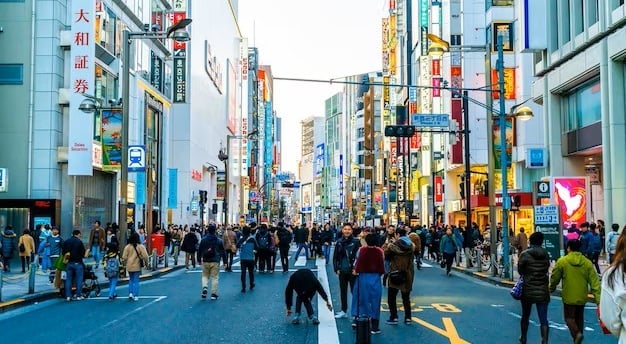Tourism Surge in Japan Drives Up Hotel Costs, Impacting Business Travellers
BUSINESS


Japan’s Tourism Boom Prices Out Business Travellers
The recent tourism boom in Japan is driving up accommodation costs, making it increasingly difficult for business travellers to find affordable lodging. Yoshiki Kojima, whose IT company frequently brings employees to Tokyo for meetings, has resorted to booking capsule hotels due to the rising prices of regular hotel rooms. Capsule hotels, a unique Japanese concept, provide small, bed-sized pods, often stacked in rows, and while they were once seen as a budget option, they are now becoming more expensive. Kojima found a more comfortable capsule hotel offering high-end amenities like quality mattresses and televisions in each pod. While a night at this hotel starts at 5,000 yen ($30), the rates are climbing, still making it more affordable than a basic private room in a business hotel, which costs an average of 20,048 yen ($130) in Tokyo.
Kojima, who brings 20 to 30 employees to Tokyo for company meetings, expressed his frustrations about balancing the cost of running his business amidst soaring accommodation fees. While Japan benefits economically from the influx of foreign tourists, which creates jobs and boosts spending, the rising costs are also negatively impacting local residents and businesses. The surge in tourism, spurred by a weak yen, has led to increased demand for hotel rooms, pushing up prices and contributing to Japan’s labor shortages, as well as higher supply costs.
The situation is forcing some business owners, like Keisuke Morimoto, to rethink their travel plans. Morimoto, who runs a kimono shop in Nara, was taken aback by the high cost of hotel rooms in Tokyo, considering a stay would cost him 60,000 yen for two nights. Some are turning to alternatives such as short-term rental platforms like Airbnb for cheaper options.
To combat overtourism, cities like Kyoto are implementing measures such as raising accommodation taxes, with up to a tenfold increase for luxury hotels. Japan aims to attract 60 million visitors annually by 2030, a target that could lead to even more expensive domestic business trips in major cities like Tokyo and Osaka, where demand for hotel rooms has spiked.
The Japanese government is encouraging tourists to visit less crowded destinations, such as rural towns, to ease pressure on city hotels. In response to the surge in visitors, major hotel operators are focusing on spreading the demand to smaller regions like Sapporo and Naha. Despite these efforts, Kojima is considering more drastic steps, such as relocating his company headquarters to Sapporo or organizing meetings in lesser-visited areas near Tokyo, to take advantage of regions not overwhelmed by tourists.
